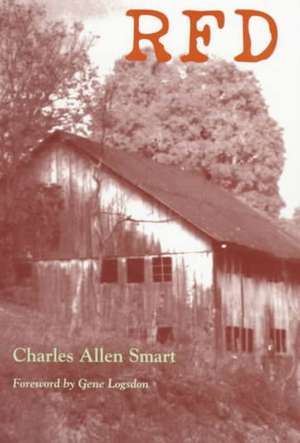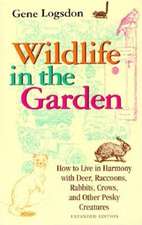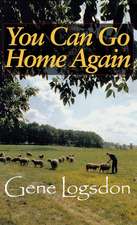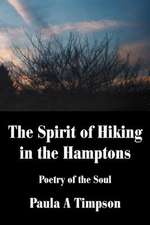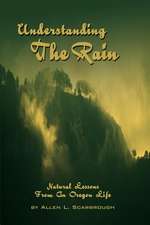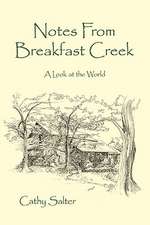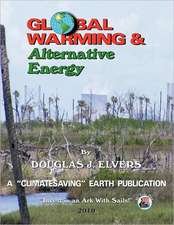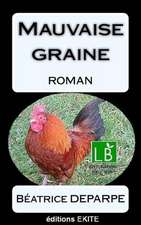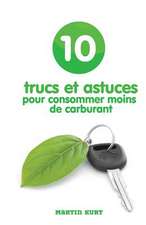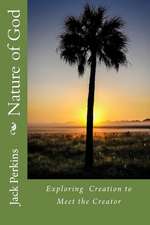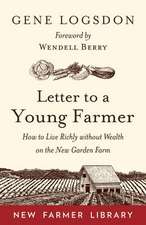R. F. D.: Charles Allen Smart
Autor Charles Allen Smart Contribuţii de Gene Logsdonen Limba Engleză Paperback – 14 iul 1998
“This book,” the author tells us in his preface, “is intended to be a picture of life on a farm in Southern Ohio in the 1930s.” It is a faithful portrait of farm life as thousands of men and women experienced it from one end of the country to the other and from pioneering times to the present century.
Originally published in 1938 to enthusiastic reviews and commercial success, RFD is the story of one couple’s trials with leaving the comforts of city life for a chance to get back to the land.
From his farm near Chillicothe, Ohio, Charles Allen Smart gives a realistic rendering of what it meant to farm in the 1930s. It is part of the book’s intrinsic honesty that it could not be as good as Walden. Thoreau had worked out a philosophy that suited him and that he was ready to recommend to others. Mr. Smart had no prescription for the general ailments, beyond a belief that creating things is important and that owning, buying, and selling things are unimportant.
What he tells us throughout this unusual book is that for him life on this particular farm, in this particular house, with this particular set-up of friends, neighbors, dogs, sheep, hens, cattle, trees, corn, vegetables, grass, and weather, costs less in human values than life in New York City—or in Chillicothe.
Ohio University Press is especially pleased to reissue this midwestern classic with a new foreword by noted farm writer Gene Logsdon.
Originally published in 1938 to enthusiastic reviews and commercial success, RFD is the story of one couple’s trials with leaving the comforts of city life for a chance to get back to the land.
From his farm near Chillicothe, Ohio, Charles Allen Smart gives a realistic rendering of what it meant to farm in the 1930s. It is part of the book’s intrinsic honesty that it could not be as good as Walden. Thoreau had worked out a philosophy that suited him and that he was ready to recommend to others. Mr. Smart had no prescription for the general ailments, beyond a belief that creating things is important and that owning, buying, and selling things are unimportant.
What he tells us throughout this unusual book is that for him life on this particular farm, in this particular house, with this particular set-up of friends, neighbors, dogs, sheep, hens, cattle, trees, corn, vegetables, grass, and weather, costs less in human values than life in New York City—or in Chillicothe.
Ohio University Press is especially pleased to reissue this midwestern classic with a new foreword by noted farm writer Gene Logsdon.
Preț: 197.60 lei
Nou
Puncte Express: 296
Preț estimativ în valută:
37.81€ • 39.48$ • 31.22£
37.81€ • 39.48$ • 31.22£
Carte tipărită la comandă
Livrare economică 15-29 aprilie
Preluare comenzi: 021 569.72.76
Specificații
ISBN-13: 9780821412541
ISBN-10: 082141254X
Pagini: 270
Dimensiuni: 127 x 191 x 23 mm
Greutate: 0.32 kg
Ediția:1
Editura: Ohio University Press
Colecția Ohio University Press
ISBN-10: 082141254X
Pagini: 270
Dimensiuni: 127 x 191 x 23 mm
Greutate: 0.32 kg
Ediția:1
Editura: Ohio University Press
Colecția Ohio University Press
Recenzii
“What a welcome resurrection! Here is a voice from the 1930s that speaks to the dilemmas we're certain to face in the next century. His mind moves easily between farming and philosophizing, between strategies for the survival of households during the Great Depression and strategies for the renewal of our ailing civilization. I would have walked a long way to meet this man. I'm glad to have his book.”—Scott Russell Sanders, author of Hunting for Hope
“This is a wonderful book. It is delightful. Smart comes across as so honest and passionate. He would have been a wonderful neighbor. I could have learned from him.” —David Kline, author of Scratching the Woodchuck: Nature on an Amish Farm
Notă biografică
Charles Allen Smart, born in Cleveland in 1904, was raised on the East Coast and died in his adopted home near Chillicothe in 1967.
Extras
“Organic nature is not, I think, completely sober, and we cannot be so if we wish to understand her, and smile. Our sober little minds are cold, and she is warm and large.”“Good farming is more complex, even, I think, than good juggling or good painting, and the odds against perfection are even greater. I have never seen a farm that justified a sour face, and too many good farmers go around looking as though they were attending their own funerals, as indeed they are.“If I have sheep for forty years, my mind may wander slowly all over the place, like a sheep, but I may be worth listening to.”“But isn’t good farming a means? And, if so, can it be so emphasized, refined, perfected that it becomes a thing of beauty, and an end, in itself?”“The hardest weather, for me, is the weather of attrition, the last week of ten weeks of rain, the fourth flood, a dry hot September after three earlier months of it in a row, the last short days of January, the last savage snowstorm in March . . . ”“We are peculiarly at the mercy of markets, because our methods and plans cannot be changed quickly, and because we have fewer sources of business information. Also, our opponent, nature, can make our best strength and brains look very small and futile, overnight. However, she is also our partner, and she has incomparably greater dignity than any other opponents and partners.”“What I’d like to see on dressed-up farmers and wear myself is kilts, with soft, loose, low collared shirts, and very short jackets. And I’d like to see beards . . . A clean-shaven face may be appropriate for a modernistic apartment or office, where everything else is clean-shaven and sexless, but it is not appropriate on a farm. A razor is as timid and citified a thing as a girdle to flatten buttocks whose glory is their curves, or a brassiére to lift up breasts that can be lifted in health and pride, or a pair of pants with buttons or—nadir reached by man in the machine age—a zipper instead of a codpiece.”“I hate quareling over property, I hate negotiation, and as you may have gathered, the whole idea of private ownership is repugnant to me. On the other hand, I did own property, and I represented both my living sister and her children and all our dead. I didn’t propose to be cheated and imposed on, and I had not forgotten the pain that some of these people, notably the Murgatroyds, had caused my aunt.”“. . . I prefer those farmers whose farms may or may not be on the messy and mortgage side, but who always smile and wave hello, and who often have time to stop, watch, and wonder, alone or with a neighbor.” “When I walk over good land and crops ruined by droughts and floods, when I feel the heat of the sun, and the cold from beyond the stars, I feel something a good deal larger than ourselves, something without any interest in us, something in whose presence we simply cannot go on being hogs, cowards, and fools, and survive.”“. . . (A) farm is a very poor place to earn a living in the ordinary meaning of that phrase, and a very rich and splendid place to earn a living in every other meaning of that phrase. I mean in the growing, so to speak, of ideas, sensations, intutions, feelings, sympathies, and delight in action, all of those things that alone justify work and money.”“It takes about thirty years of active work, experiment, observation, and study to make a passable farmer.”“. . . [A]nyone who isn’t stupid enough to spend all his time trying to farm, or to make money, or books, or something, knows that a neighbor’s orchard is a perfect place for making love.”“The ends of farming are certainly not natural; that is to say, nature has never made a farm apart from man, as she makes some deep-sea fishes, just for the hell of it. . . . And as for society, if it is so stupid as to half-starve itself, while hiring us to grow less food, surely our feeding it isn’t so important as to justify . . . the clouding of our days.”“There is also a society of trees, which is certainly more important to human society, and is more important to me personally, than the gracious society of flowers. When your old trees, your old friends, are dying, and being hewn into firewood, not only a reasonable attention to the first principles of agriculture, but also an inner hunger, a psychological necessity, demands their replacement. They cannot really be replaced, within a century or two, but as any old person, and especially any old person without children and grandchildren, will tell you, a beginning is already something.”“The ends of farming are certainly not natural; that is to say, nature has never made a farm apart from man, as she makes some deep-sea fishes, just for the hell of it.”“A farmer may use his empirical knowledge most, but his intuitions, based on experience unconscious or forgotten, and aroused by sympathy, are to me more exciting. They may even be more important. I like to see a good hand at a job, but I like even better to see a farmer at work who is so close to his animals that he knows what they need without any kind of thought at all.”“Look at any farmer, no matter how old, tough, and experienced, when he is taking care of his calves, or colts, or lambs, or pigs, or whatnot. Look at him, look at the small fry and their mothers, and feel the pulse of something beating.”“The only people I know who make what educated and lucky city people would call a decent living have farms of a thousand acres or more. My kind of farming is not for incompetents and weaklings; it is for people who have no interest in ‘getting ahead,’ who like animals and plants more than machinery, processes more than figures, solitude more than most company, and a hunting cap more than a derby hat.”“. . . Peggy has supper ready before the fire, but has taken time to make us both a little drink. So we sit there, a minute, before the fire, and raise our glasses to each other, and talk about this and that, and fall silent. Then we eat, well, and clean up the table. Sometimes we call up Gerald Rowan, or somebody, and go to a movie. Or else we stay at home, and listen to music, or play chess, or talk, or read, sometimes aloud, some book that has blood in it . . . Then we put the dogs in their kennel, take the air a few minutes in the cold moonlight, listening to a hound somewhere far away, and go to bed. And after a while, when we are lying close to each other, and the windows are open, we watch the black limbs moving, and listen to the wind, or to a mouse in the wainscoting, and watch the moving firelight on the ceiling.“If there is a god, anywhere, who has done this to me, let him hear my thanks."
Descriere
The classic story of a 1930s transplanted New Yorker in the rural Midwest.
